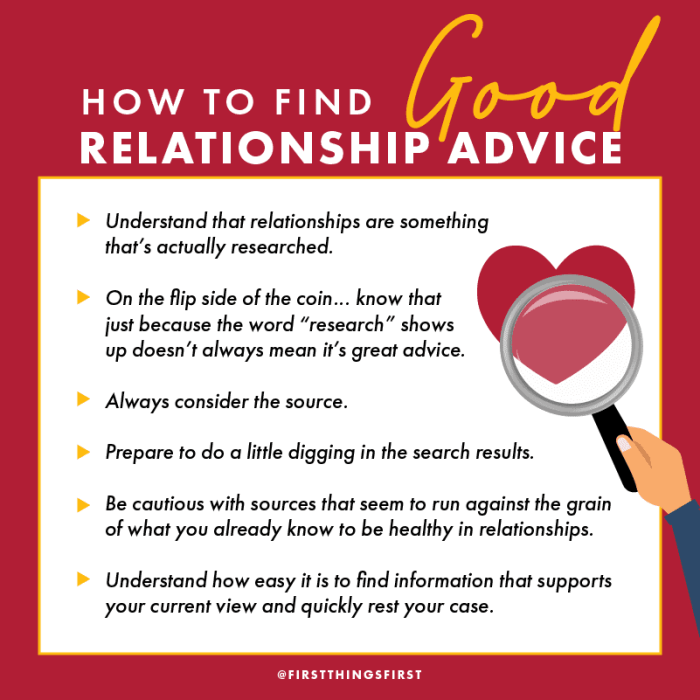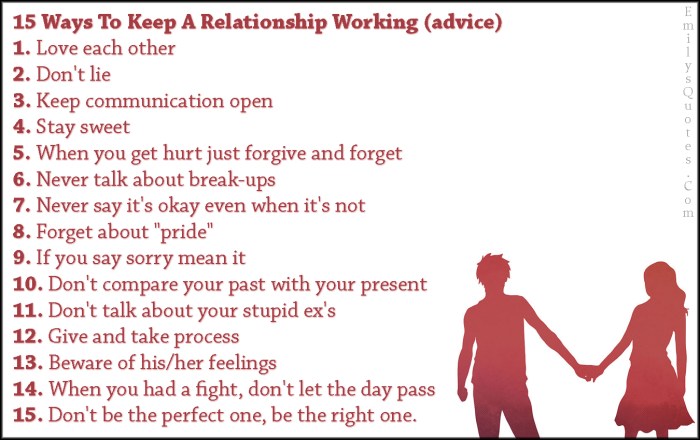Relationship Advice: Key Tips for Stronger Bonds sets the stage for an epic journey into the world of navigating relationships, offering insights and strategies for building healthier connections. From effective communication to building trust, get ready to dive deep into the realm of relationship wisdom.
In today’s fast-paced world, seeking advice on relationships is more important than ever. Whether it’s improving communication, building trust, or navigating challenges, having the right guidance can make all the difference in fostering a strong and lasting bond.
Importance of Relationship Advice

Relationship advice is like the GPS for love – it helps you navigate the twists and turns of relationships, leading you to a happier and healthier connection with your partner. Seeking relationship advice is crucial for maintaining strong and long-lasting relationships, as it provides valuable insights, perspectives, and strategies to overcome challenges that may arise.
Improving Communication
Effective communication is key to a successful relationship, and relationship advice can play a significant role in enhancing communication between partners. By seeking advice from professionals or experienced individuals, couples can learn how to express their thoughts and feelings openly, listen actively, and resolve conflicts peacefully. This can lead to a deeper understanding of each other and strengthen the bond between partners.
Navigating Challenging Situations
Every relationship faces its fair share of ups and downs, and navigating challenging situations can be daunting without the right guidance. Relationship advice can provide couples with tools and strategies to handle issues such as trust issues, infidelity, financial problems, or lack of intimacy. By seeking advice, couples can gain a fresh perspective, identify underlying issues, and work together to find solutions that benefit both parties.
Sources of Relationship Advice
Seeking relationship advice is a common practice for individuals looking to navigate the complexities of romantic partnerships. Here are some of the primary sources where people turn to for guidance.
Friends and Family
- Friends and family members often serve as the first line of support for individuals seeking relationship advice. They offer a familiar and comforting space for open discussions about personal matters.
- Benefit from the advice of friends and family who know you well and have your best interests at heart. Their insights are often based on firsthand knowledge and personal experiences.
- However, be mindful of bias and potential conflicts of interest that may arise when seeking advice from close relationships. It’s essential to consider multiple perspectives to make well-informed decisions.
Professional Relationship Counselors
- Professional relationship counselors are trained experts who provide specialized advice and guidance to couples and individuals facing challenges in their relationships.
- They offer a neutral and objective perspective, helping clients navigate complex emotions and communication barriers effectively.
- Professional counselors use evidence-based techniques and therapeutic interventions to address underlying issues and promote healthy relationship dynamics.
- Working with a professional counselor can lead to significant improvements in communication, conflict resolution, and overall relationship satisfaction.
Effective Communication in Relationships
Effective communication is crucial in maintaining healthy relationships. It helps to build trust, resolve conflicts, and strengthen the emotional bond between partners. Without effective communication, misunderstandings can arise, leading to resentment and distance in the relationship.
Importance of Communication
- Expressing thoughts and feelings openly and honestly can create a deeper connection with your partner.
- Listening actively and attentively shows respect and understanding, fostering a sense of validation and support.
- Clarifying expectations and boundaries through communication can avoid misunderstandings and prevent conflicts.
- Resolving issues through calm and constructive communication can strengthen the relationship and build resilience for future challenges.
Tips to Improve Communication
- Practice active listening by giving your full attention, maintaining eye contact, and summarizing what your partner has said to show understanding.
- Use “I” statements to express your thoughts and feelings without placing blame or causing defensiveness.
- Schedule regular check-ins to discuss relationship dynamics, concerns, and goals openly and honestly.
- Seek professional help from a therapist or counselor if communication barriers persist or become too challenging to overcome on your own.
Overcoming Communication Barriers
- Identify and address emotional triggers that may hinder effective communication, such as past traumas or insecurities.
- Avoid assumptions and mind-reading by asking for clarification or sharing your perspective openly.
- Practice empathy and understanding by putting yourself in your partner’s shoes to see things from their point of view.
- Take breaks when emotions run high to cool off and reflect before continuing the conversation in a more constructive manner.
Building Trust and Intimacy

Building trust and intimacy are essential components of a healthy and successful relationship. Trust forms the foundation of a strong bond between partners, while intimacy fosters emotional connection and closeness.
The Significance of Trust and Intimacy
- Trust allows partners to feel secure and safe in the relationship, knowing that they can rely on each other.
- Intimacy builds emotional connection, increases vulnerability, and strengthens the bond between partners.
- Both trust and intimacy contribute to open communication, honesty, and mutual respect in a relationship.
Strategies to Build Trust and Intimacy, Relationship Advice
- Communicate openly and honestly with your partner, sharing thoughts, feelings, and concerns.
- Be reliable and consistent in your actions to demonstrate trustworthiness.
- Show empathy and understanding towards your partner’s feelings and experiences.
- Spend quality time together, engaging in activities that promote connection and intimacy.
- Practice active listening and validate your partner’s emotions to strengthen the bond between you.
Impact of Past Experiences on Trust Levels
Past experiences, such as previous relationships, childhood upbringing, or traumatic events, can significantly influence trust levels in a current relationship. It is essential to acknowledge and address any trust issues that may arise due to past experiences, seeking support from a therapist or counselor if needed.